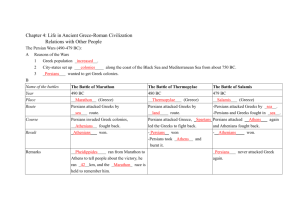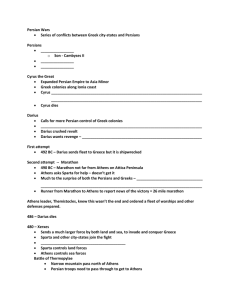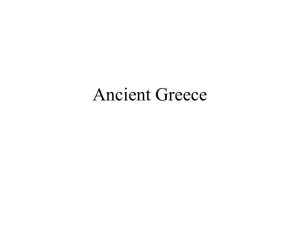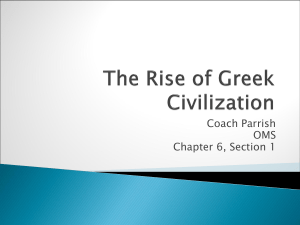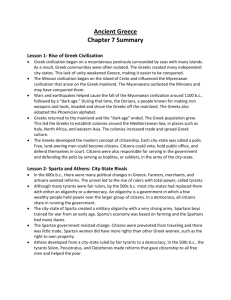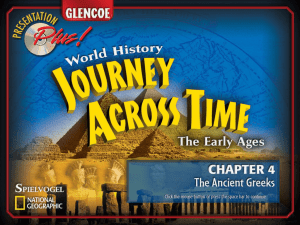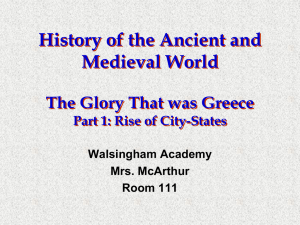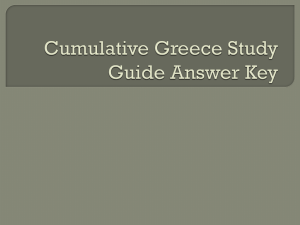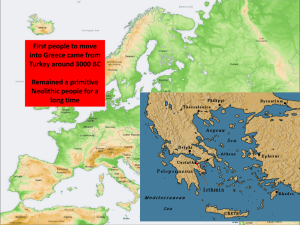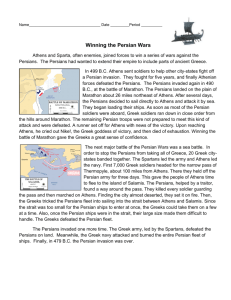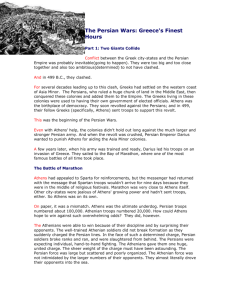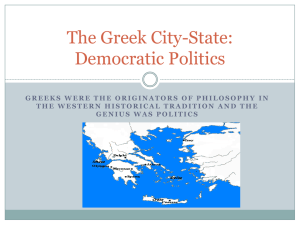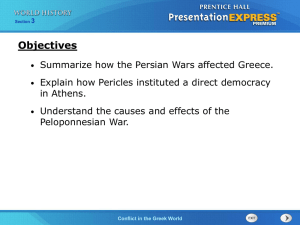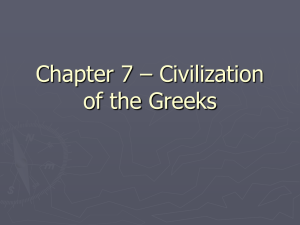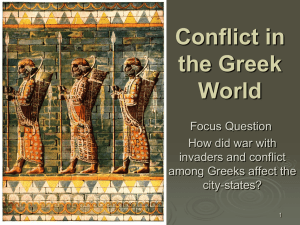Chapter 4 Ancient Greece 1 ppt
advertisement
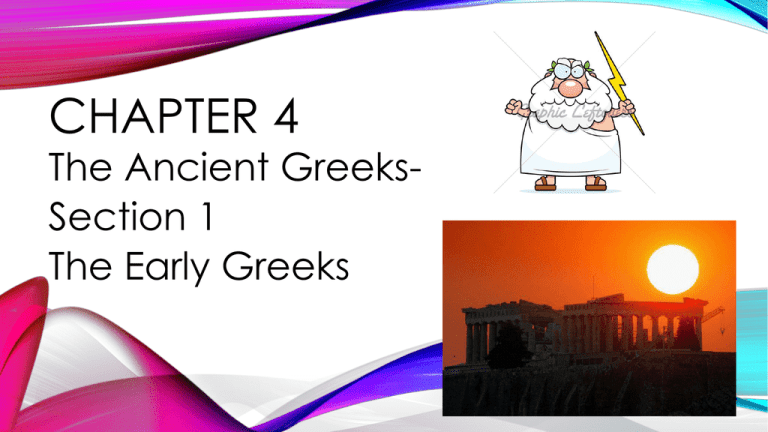
CHAPTER 4 The Ancient GreeksSection 1 The Early Greeks • Mainland Greece is a peninsula- A body of land with water on three sides. • The geography of Greece (mountains, seas, etc.) resulted in many independent Greek communities. THE MINOANS • The island of Crete lies southeast of the Greek mainland. • The Minoans were not Greeks, but they were the first civilization to inhabit what would later be known as Greece. • The Minoans created an extravagant palace in Knossos and made their wealth by trading. • By 2000 B.C. they controlled the eastern Mediterranean Sea. • About 1450 B.C. the Minoan civilization collapsed. Some historians believed they fell due to natural causes. Others believe a group from the mainland, the Mycenaeans invaded Crete. THE FIRST GREEK KINGDOMS • Originally from central Asia, Mycenaeans invaded Greeks mainland in the 1800’s B.C. and Mycenaean leaders became the first Greek kings. • The palace of the ruler stood in the middle of the kingdom. Nobles, farmers and slaves lived beyond the palace walls. • Mycenaeans learned much from the Minoans- how to work bronze, build ships, use the sun and stars to find their way at sea, religion- before conquering them. • Myceneans were successful in trade but took pride in their deeds in battle. Their most famous victory is the Trojan War, led by King Agamemnon. • By 1100 B.C., Mycenaean civilization had collapsed due to earthquakes & fighting within kingdoms. • 1100 B.C. and 750 B.C. – The Dark Age Farmers grew food only for their families Education ceased Many Greeks left the mainland, expanding the reach of Greek culture • The Dorians moved in and settled on the Peloponnesus peninsula. They brought advanced weapons and farm technology. • Gradually people began to farm and educate again. They adopted the idea of an alphabet from the Phoenicians. • As the Greek population grew, cities began sending people outside Greece to start colonies. • Colony – a settlement in a new territory that keeps close ties to its homeland. Colonization led to the growth of trade and industry. The Polis • At the end of the Dark Age, many nobles had overthrown the Greek kings and created city-states, known as a polis • Acropolis – a fortified area at the top of a hill used as a gathering place in the polis Sometimes a religious center • Agora – an open area below the acropolis that served as both a market and a meeting/debating place Citizenship • Greeks were the first people to develop the idea of citizenship. • Citizens – members of a political community who treat each other as equals and who have rights and responsibilities. (Only free native-born men who owned land) • In exchange for their rights (elect officials, pass laws, hold office, own property), citizens must serve in government and fight as citizen soldiers. Section 2- Sparta and Athens • Rule by the nobles began to decline by 650 B.C. Small farmers demanded changes in the power structure and merchants and artisans wanted to be a part of government. • The growing frustration led to the rise of tyrants. Tyrant – someone who takes power by force and rules with total authority. • • • Tyrants overthrew the nobles during the 600’s. However, most Greeks wanted rule by law with all citizens participating in government. By 500 B.C., most city-states had become either oligarchies or democracies: Oligarchy – a form of government in which only a few hold power Democracy – a form of government in which all citizens share in running the government Sparta (oligarchy) and Athens (democracy) became two of the most powerful governments of early Greece. • Sparta was founded by the Dorians who enslaved their neighbors, the Helots, to be workers • Fearing the Helots might someday rebel, government firmly controlled the people and trained the men for war • Spartan soldiers were trained until age 30, but remained in the army until age 60 • Spartan girls were trained in sports – running & wrestling • Spartan government included two kings. They headed a council of elders who presented laws to an assembly. • The assembly voted on the laws and chose 5 ephors Ephor – a person who enforced the laws and managed tax collection • By focusing on military training, the Spartans fell behind in trade, technology and science, but played a key role in defending Greece ATHENS • Athenians focused on providing boys a good education, sports, and music • At age 18, boys finished school and became citizens and girls were taught at home by their mothers • During the 600’s B.C., Athens was an oligarchy ruled by landowning nobles • During the early 500’s B.C., the government was in much turmoil due to rebellion by the farmers • Cleisthenes, their most important leader, made the Athenian government a democracy Section 3- The Persian Empire • Persians lived in what is today southwestern Iran • Cyrus the Great (559 B.C. to 530 B.C.) united the Persians into a powerful kingdom, larger than any in the world • In 539 B.C., Cyrus’ armies captured Babylon, northern Mesopotamia, Asia Minor, Syria, Canaan, and the Phoenician cities • King Darius (521 B.C.) reorganized the government, dividing the empire into 20 states called satrapies • The Persian government paid people to be full-time soldiers, unlike the Greek city-states (citizen soldiers) • The Greeks often clashed with the Persians while setting up colonies in the Mediterranean region • The Greeks and the Persians fought in several key battles Battle of Marathon –Athenians successfully defeated the Persians as they attempted to attack Athens King Xerxes, Darius’ son, vowed revenge against the Athenians Battle of Thermopylae –Greek soldiers survived but Sparta’s King Leonidas and several hundred others fought to the death, losing this battle Strait of Salamis – naval battle the Greeks won decidedly with smaller, faster, and easier to steer ships • Battle of Plataea (479 B.C.) – the Greek army crushed the Persian army at Plataea, northwest of Athens This battle convinced the Persians to retreat to Asia Minor The Fall of the Persian Empire • A weakened army, high taxes which led to rebellions, and fighting within the royal family made Persia vulnerable to attack • Persian Empire was conquered by Alexander the Great in 334 B.C. Section 4- The Age of Pericles Population of Athens, 400s B.C. 100,000 Citizens 150,000 35,000 Foreigners Slaves • Persians remained a threat to Greece • Delian League – group of city-states, including Athens, but not Sparta who united in 478 B.C. to defend themselves against the Persians • Democracy in Athens Direct democracy- People gather at mass meetings to decide government matters and every citizen can vote on laws and policies Representative democracy (U.S.) – citizens choose a smaller group of representatives to make laws and governmental decisions on their behalf Delian Leagues Direct Democracy • Usually fewer than 6,000 men attended the assembly meetings, which were held every 10 days • The assembly passed all laws, elected officials, and made decisions on war and foreign affairs • Ten officials known as generals carried out the assembly’s laws and policies Pericles One of the leading figures in Athenian politics • Guided Athens for more than 30 years • Helped Athens dominate/control the Delian league • Strived to make Athens more democratic • The Age of Pericles was a period of cultural prosperity – tremendous creativity and learning The Peloponnesian War (431 – 404 B.C.) • Sparta vs. Athens for control of Greece • Did not understand or trust each other and clashed over political ideology and perceived aggression • The Spartans made a deal with the Persian Empire They exchanged Greek territory in Asia Minor for enough money to build a navy • Sparta’s new navy destroyed the Athenian fleet Effects of the war Weakened all of the major Greek city-states Many people died, farms were destroyed, people lost jobs Made it impossible for the Greeks to unite and work together again 30 years later, war broke out again, further weakening the kingdom



